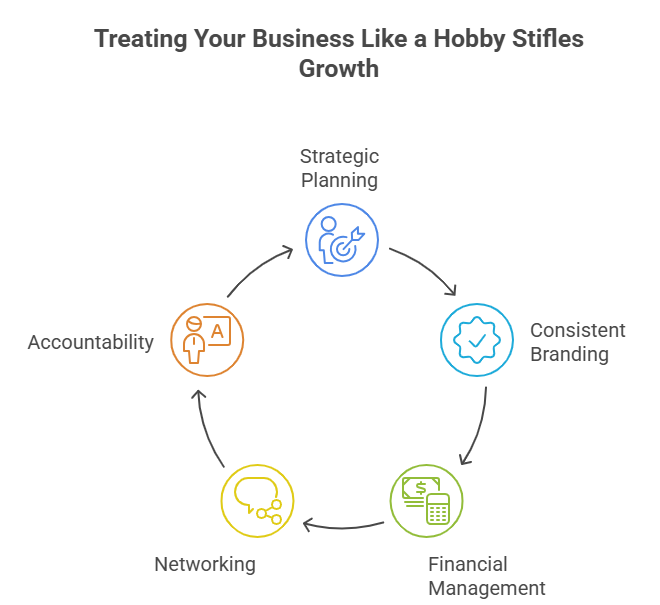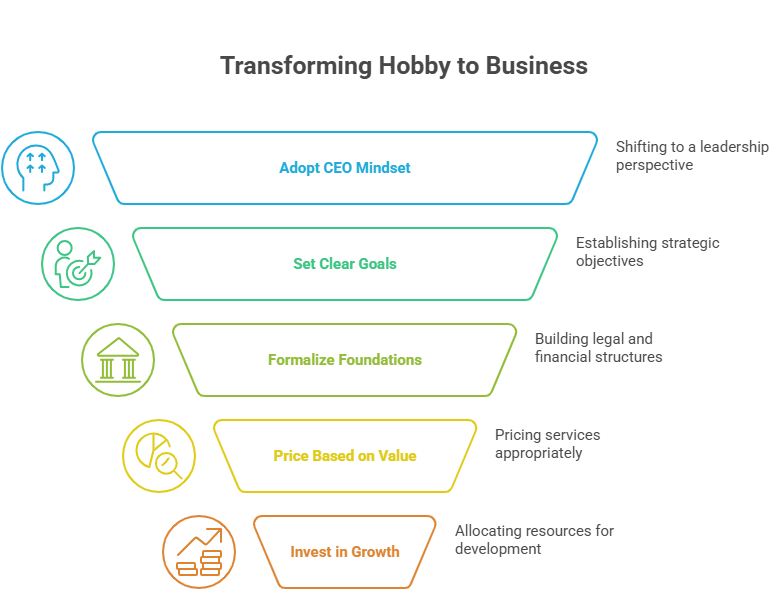You may be calling it a business, but are you treating it like one?
Many entrepreneurs work hard but stay stuck. It’s not only that they lack talent or drive, but also that they’re still operating with a hobby mindset. They only work when it’s convenient, avoid setting goals and underprice their services to avoid rejection.
This approach doesn’t just delay progress, it puts a cap on how far you can grow.
Think of your business like a vehicle. If you never fuel it, check the engine or steer it with purpose, it won’t take you far. The same goes for treating your business without structure, strategy or commitment.
Here’s a question: Are you building a business or just staying busy?
If you want real income, real impact and real success, you need to treat your business like the serious venture it is. Let’s look at how acting like a hobbyist blocks your growth and what to do instead to finally unlock your full business potential.
Hobby vs. Business: Why the Distinction Matters

It’s easy to say you own a business. It’s harder to run one with purpose. The line between a hobby and a business isn’t blurry; it’s built on daily decisions.
Defining Hobbyist Behavior
A hobby is something you do for fun, without pressure or plans. That’s fine if you’re knitting on weekends or growing tomatoes. But when you treat your business the same way, growth becomes accidental if it happens at all.
Hobby-minded business owners often
- Work only when inspired or “have time.”
- Avoid setting goals or tracking progress.
- Underprice services because afraid to lose clients.
- Skip planning and rely on guesswork.
- Don’t reinvest in tools, learning, or support
This approach might feel safe, but it keeps you spinning your wheels. There’s no map, no direction and no clear path forward.
Business-Minded Behavior
A real business operates with intention. Every hour, dollar and effort has a purpose.
Business-minded entrepreneurs:
- Set specific goals and track progress.
- Stick to a consistent work schedule.
- Create systems to run more efficiently.
- Market with purpose and strategy.
- Treat every client interaction like a brand moment.
They don’t wait for motivation. They rely on discipline and data. Their success isn’t based on luck; it’s built on structure.
Why We Fall Into Hobby Thinking: Rewire It

Most people don’t treat their business like a hobby because they’re lazy or unmotivated. They do it because of what’s happening beneath the surface in their beliefs, identity, and unconscious fears.
Hobby thinking is often a form of protection. If we don’t fully commit, we don’t have to fully fail. We keep things “casual” because taking real ownership feels risky. Common mindset blocks behind hobby behavior:
- Fear of failure: “If I go all-in and it doesn’t work, what does that say about me?”
- Low self-worth: “Who am I to charge that much or call myself a real business owner?”
- Imposter syndrome: “I’m not ready. I don’t know enough yet.”
- Avoidance of responsibility: “If I don’t plan or track anything, I don’t have to face what’s not working.”
These patterns run deep and they often start long before someone becomes an entrepreneur.
You can rewire these beliefs. You can train your brain, just like you’d train a muscle, to support the identity of a confident business leader. Here’s how to begin:
- Raise your awareness. Catch the thought when it shows up: “I’m not ready,” “This won’t work,” or “I don’t want to be too visible.” Label it; don’t live in it.
- Reframe the fear. Instead of “What if I fail?” Try, “What if I succeed and I’m more than ready?”
- Act your way into belief. Identity shifts through action. Set goals. Make the call. Raise the rate. Confidence grows by doing.
- Get support. Coaching, NLP and community help interrupt old patterns and create new beliefs that stick.
You don’t need to fix everything at once. You just need to stop letting fear make the decisions. The moment you start acting like the business owner you want to be is the moment your results begin to change.
The Real Cost of Hobby Thinking
Let’s get honest. If this mindset continues, what does your business look like in six months? A year? Five years?
Here’s what hobby thinking costs you over time:
- Missed income and pricing opportunities
- Wasted time on low-impact tasks
- Inconsistent client flow and cash flow
- Loss of motivation and confidence
- A brand that never gets built
- Burnout without rewards
You don’t need a bigger social media following. You need a bigger mindset.
Five Ways Treating Your Business Like a Hobby Stifles Growth

If your business isn’t growing the way you hoped, chances are you’re still treating it like a side gig, whether you mean to or not. The shift from hobby to real business doesn’t happen overnight but it starts with recognizing what’s holding you back.
Lack of Strategic Planning
A hobby doesn’t need a roadmap. A business does. Without clear goals, a plan and a way to measure progress, you’re just reacting to whatever comes your way. That might keep you busy but it won’t move you forward.
Business owners who grow know exactly what they’re working toward each month. They don’t just hope for results, they plan for them.
Inconsistent Branding and Marketing
Showing up once in a while, posting randomly, or changing your message every other week confuses potential customers. People need to trust you before they buy from you and trust comes from consistency.
When you treat your business seriously, marketing becomes a system, not a second thought. Your brand starts to feel familiar, reliable and professional.
Financial Mismanagement
Hobbyists often undercharge, mix personal and business money, or avoid tracking income and expenses. That might work for a side project but it’s a recipe for stress in business.
If you want to earn more, you have to treat money like a business tool, not something you’ll “figure out later.” Pricing, budgeting, and reinvestment aren’t optional. They’re the foundation.
Missed Networking and Collaboration Opportunities
Real growth rarely happens alone. People who treat their business like a hobby usually avoid networking events, business groups or partnerships. They keep to themselves, thinking they can do it all solo.
But relationships open doors to clients, referrals, feedback, and support. When you stay visible and active in your community, you attract opportunities that don’t show up when you’re working behind closed doors.
No Accountability or Mentorship
When no one’s keeping you on track, it’s easy to drift. Hobbyists tend to avoid coaching, feedback or accountability. They often think, “I’ll figure it out myself.”
But even the best business owners have mentors. They ask questions, seek advice and stay open to growth. Success comes faster when you have someone to guide you and someone to challenge you.
Transforming Your Hobby into a True Business: A Practical Action Plan

If you’ve been treating your business like a side project, it’s time to make a shift, one that changes how you think, act and plan. This is the stage where you move from “just doing the work” to building something that can actually grow and sustain itself.
Here’s a practical plan to help you shift from side-project mode to running a real business one with purpose, systems and room to grow.
Adopt a CEO Mindset
You’re not just doing the work, you’re leading the business. That shift starts with seeing yourself differently.
Start asking:
- What’s my long-term vision?
- What does success actually look like?
- What would a leader in my position do next?
A CEO doesn’t operate on chaos and emotion. They act on goals, data and clear plans. Start thinking like the person who runs the business you want to have.
Set Clear Goals and a Scalable Strategy
You can’t grow what you don’t track. Stop working aimlessly and start targeting results.
Focus on:
- Monthly and weekly goals (income, leads, content, etc.).
- Time tracking so you know where your effort is going.
- Tools to manage projects, content and client workflows.
- A repeatable marketing plan (not just random posting).
Clarity helps you work smarter, not harder.
Block Business Hours Into Your Schedule
Waiting for inspiration is a hobbyist habit. Business owners set work hours and stick to them, whether they feel “in the zone” or not.
Your schedule reflects your commitment. Protect that time like it matters, because it does.
Formalize the Foundations
If you’re still sending casual texts instead of contracts, it’s time to level up.
Set up:
- Legal business registration in your state.
- A separate business bank account.
- Contracts for clients or service agreements.
- Invoicing software and simple financial tools.
Running your business legally and professionally builds trust and makes it easier to scale.
Price Based on Value, Not Fear
Underpricing might feel safer, but it tells people your work isn’t worth much.
Do your research. Price your services for what they’re actually worth. You’re not just selling hours, you’re solving problems.
Invest in Yourself and Your Business
Growth requires input. Time, money, energy, you won’t move forward without putting something in.
Smart investments:
- Education: courses, books, skill-building.
- Coaching or mentoring: faster progress, fewer wrong turns.
- Tools: software that saves time or improves output.
- Services: design, copywriting, bookkeeping, whatever drains you.
Hobbyists wait for “someday.” Business owners, act now.
Show Up in Your Business Community
You don’t grow in a bubble. People need to know you exist and trust you. Start by:
- Attending networking events
- Joining online or local groups.
- Offering value in conversations.
- Sharing what you do clearly and confidently.
Opportunities follow visibility. But first, you have to show up.
Track Your Money Like a Business Owner
Mixing business and personal money creates confusion and chaos. Keep it simple:
- Use separate bank accounts.
- Track every dollar in and out.
- Know your monthly income, expenses and profit.
When you understand your numbers, you make better decisions, period.
Internal Shifts That Support External Growth
Business growth doesn’t just come from tasks; it comes from mindset changes. Here are three mental shifts to start practicing now:
From Worker to Leader
Stop just “doing the work” and start making decisions. Lead your schedule. Lead your pricing. Lead your clients.
From Waiting to Initiating
Don’t wait until you feel ready or “have time.” Make time. Choose an action now. Movement creates clarity.
From Trying to Training
Success isn’t about trying hard once it’s about training yourself to show up consistently. Every time you act like a CEO, you become one.
Conclusion: Your Business Reflects Your Beliefs
If your business isn’t growing the way you want, it might be because you’ve been treating it like something optional, like a hobby. That doesn’t mean you’ve failed. It just means you work hard without real growth.
You don’t need more time. You need more ownership. Every successful business starts with one decision: to treat it like it matters.
Your potential doesn’t live in endless planning or playing it safe. It shows up when you act like the leader your business needs, even when no one’s clapping yet.
Stop waiting to feel ready. Start acting like you’re already building something real. Because once you do, your business will finally have the space, energy and structure it needs to grow.





